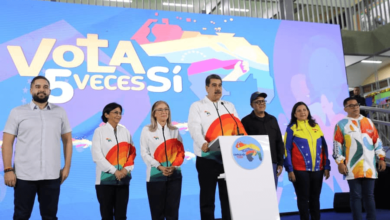On Aug. 15, President Hugo Chávez announced the proposal of 33 new reforms to Venezuela’s constitution. The reforms, if adopted, would be another significant step in the Bolivarian Revolution’s march toward “21st century socialism.”
Among the proposed reforms are the following: (1) bringing the central bank, which is currently independent, under the
 |
A major aspect of the reforms is the designation of communal councils as a pillar of government, alongside the executive, judicial and legislative branches. Communal councils are grassroots community organizations that have been growing across the country with the support of the government since early 2006.
These units of popular organization, which now number over 20,000, have been a key vehicle for incorporating the Venezuelan masses into the Bolivarian Revolution. The proposed reforms would designate the communal councils as the “basic nucleus of the socialist state,” securing their authority to administer directly to the needs of the communities with funding mandated directly from the national budget.
Chávez referred to this political-territorial restructuring as “the new geometry of power,” which would empower the organized communities and advance citizens’ participation and social property. “Sovereignty rests with the people,” said Chávez, “and should be exercised directly through the organs of popular power.”
Chávez emphasized that the restructuring is a revolutionary step toward breaking up the old oligarchic structures of society. “If we don’t change the superstructure, the old superstructure will defeat us,” he said.
The reforms would further advance the development of public, social and collective property. The current constitution states that any property may be expropriated for just cause—the public good—with adequate compensation given. The reforms would lift the restriction of needing a court order to accomplish this.
Venezuela has nationalized its oil fields, as well as electric and telecommunications industries.
At the same time, however, Chávez assured critics that private property would continue to be protected under the constitution.
The new people’s militia, comprised of tens of thousands of civilians training to defend the revolutionary process alongside the military, would replace the reserves as the Popular Bolivarian Militia. The Venezuelan military would be redefined as a patriotic and anti-imperialist force.
In addition to mandating a six hour workday, the proposed measures would create a Social Stability Fund for self employed workers to guarantee them the same rights as other workers, such as retirement pensions, paid vacations, and prenatal and postnatal leave.
National popular debate
Ignoring the breadth of the reforms, opposition leaders and critics seized solely on the proposed removal of term limits on the presidency, accusing Chávez of orchestrating a “coup” to enable him to be “reelected for life.”
Chávez shot back, pointing out that many European countries do not have term limits either. “They are making a big deal because here we are proposing that the people decide about something that has existed in Europe for centuries,” he said.
“Here if you want to change a single comma of the constitution you cannot do it without the approval of the people in a national referendum. It is the people who are in charge here. I wish in Europe they would do that. I wish they would consult the people about the economic and political systems there,” Chávez said.
“Some pollsters try to manipulate public opinion, formulating questions such as ‘do you support democracy or socialism?’” noted Chávez. “But the people aren’t stupid. Only through socialism can you construct true democracy.”
With thousands of supporters holding banners reading, “Yes to the reform! On the path to 21st century socialism!” the proposed measures were debated by the National Assembly (AN) on Aug. 21 and initially accepted by a unanimous vote. “We are reforming the constitution to solidify … the socialist nation, the socialist state, the socialist democracy,” said legislator Carlos Escarra, who helped draft the reforms.
After a second vote in the AN, they will be presented in a national referendum to be voted on by the Venezuelan people scheduled for early December. In preparation for the referendum, the AN is forming brigades to facilitate a massive national political debate across the country.
The objective is “to activate a national political debate and the participation of the people in the process of constitutional reform aimed to strengthen revolutionary consciousness, stimulate popular mobilization, and guarantee the sovereign expression of the majority on the occasion of the referendum.”
Venezuela is not yet a socialist state. The revolutionary process is not finished. Fundamental issues remain to be decided.
At each step, the Bolivarian Revolution has moved with caution, reflecting the ever-present threats from U.S. imperialism and their counterrevolutionary allies.
But Chávez and other revolutionary leaders are orienting state policies and structures toward empowering the working class.
Capitalism is not a viable option for Venezuela’s workers. The new reforms can help make the aspirations of millions of Venezuelans closer to becoming reality.
Click here to read the special issue of Socialism and Liberation on Venezuela.






